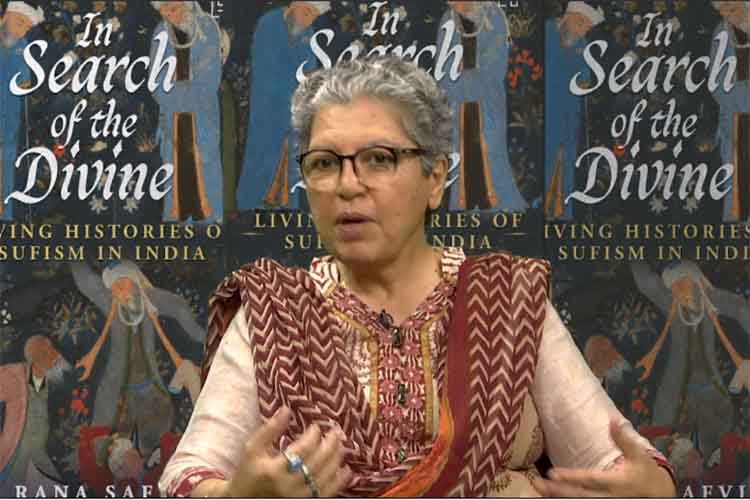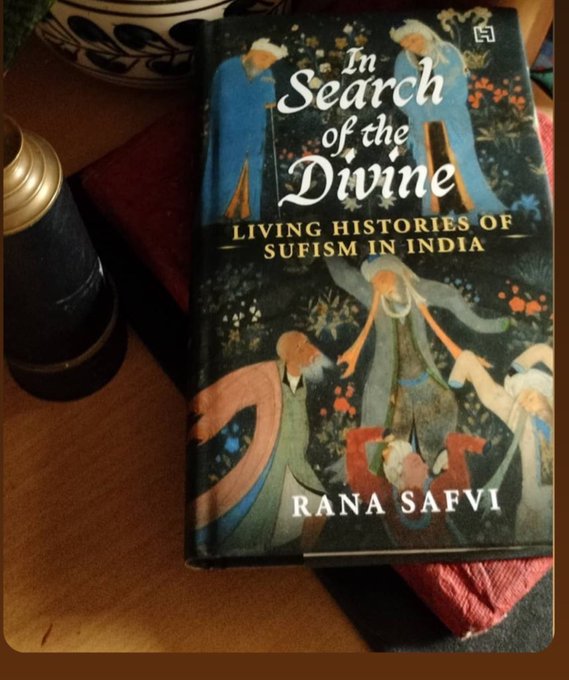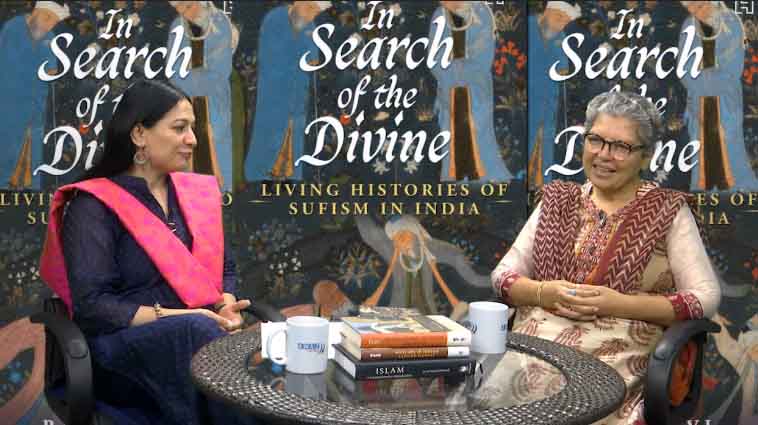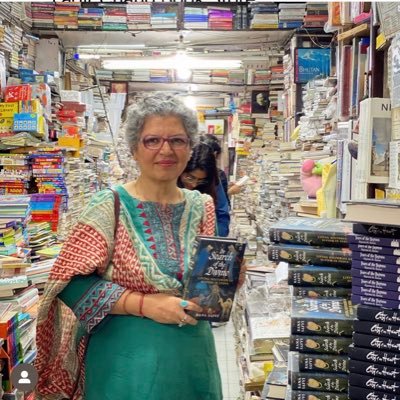
Rana Safvi is an acclaimed author, blogger and translator. Her passion for preserving and documenting India's inclusive heritage called Ganga-Jamuni tehzeeb is reflected in the theme of her books, blog, and poetry. Author Rana Safvi spoke about her latest book “In search of the Divine: Living histories of Sufism in India” to Dr Amna Mirza of the Delhi University in the studio of Awaz the Voice in Delhi. Follwing are the edited excerpts of the conversation:
Amna Mirza: When we talk about Sufism we try to link it to the historical. What made you pick up the philosophical yet historical and also at the same time a topic has a very important interface with our everyday lives? And on that note, what made you dwell on this topic - history, philosophy, everyday life messages?
You see, I've written this in the book also that there is a very old Indian parable about five blind men who go to touch an elephant/ Somebody touches the stomach, somebody the trunk, and somebody the tail and somebody the ears. They describe it according to their own experiences. So Sufism, which is actually very much a part of Islam is seen by various people, the layperson who doesn't understand what this is in different ways. Some see it in music, some see it as tasavvuf, and some see it by going to a shrine (dargah).
So it depends on what your angle is. Seeing it I wanted to write about this and bring all of this under one gamut Sufism is all this and much more. It's a contemplative discipline. It's an inner contemplation of God that is the realization of God within you and it is also in the present day a way of interacting with the divine and various people have various ways of interacting. Someone may just tie a thread on a jaali and that may be his interaction because he's talking directly one on one, or maybe somebody who is doing a chilla or a retreat who is praying through hours and hours is connecting to the Almighty. So it depends on how one is seeing it and how one is interacting with the divine in their way and there is no way which one we can say is correct.

Rana Safvi's latest book (Twitter)
Going through the book, one finds Sufism not only the subject, but you try to trace it through music, prayers, and architecture. That's why I say that your book in search of the divine indeed has a vast canvas. Now, as you see these multiple interpretations of Sufism, multiple existences of the Sufi bigger message. Which one was most interesting, like tracing it through music or architecture or the prayers or the silent communications, and which one of them was the most interesting part of the study?
See, some of it was academic; how Sufism grew within Islam, how Sufism spread out all over the world. What were the philosophies, what are the guiding principles that impelled them forward, how did each saint express himself and what were their ways of communicating with the public as well as communicating with God? But for me, of course, all this was very interesting, but because of the way I've been working and conceiving this book. An important and interesting part was interacting with the people who come to the dargah.
I wanted to understand their motive. I went through academic research. I understood what it was that took a person to say in the 12th or the 13th century when somebody comes to the Khankah of Qutub Saab, saying he was coming for some religious, and, intellectual stimulation. But why is somebody who has no idea of who a Sufi is or dargah coming there to pray? Why is he coming? So for me, human interaction was very important apart from the historical and academic aspects.
As an academician, you have also looked at the textual resources and now as a writer, you have tried to learn from the experiences of people. How easy or difficult was it because you're navigating in different boats altogether, one as a historian, then another of experiential observing as the author?
Weaving the whole story together, making it very interesting for the reader; making it very narrative, very rich, and like all of it. Refer to it through people, whether it is academic texts, primary sources, or oral history. So just that was a challenge and I worked on that. So, you know to make it very interesting for the person to read as well as making it absolutely watertight as far as the research goes.
Help us understand when you were there in this journey of understanding people because when we interact with anyone, it definitely leads to some changes in us. You know the vibes and how we connect. So, tell us while you were writing this beautiful book, what changed inside you as a person and as an author?
A very small and simple thing and something which I get reminded of every day and many times a day when I was researching about the Sirat-e-Rasool, Sirat-e-Nabi because the Prophet’s (PBUH), his ikhlak, ehsaan, and imaan are very integral it to not only Islam but also sufism. Which is why I say that Sufism cannot be separated from Islam, it is the heart of Islam and this is from the hadis-e-Gibraiel. It's called the Umme hadis, or the mother of all the haddis. Of us is the hadith in which the angel Gabraiel comes and sits and interacts with the prophet in the Masjid-Nabvi.
 Rana Safvi speaking to Dr Amna Mirza
Rana Safvi speaking to Dr Amna Mirza
The first and the second chapters are devoted to the Prophet. when I was writing about him, some of the things that I read about him were some of his Haddis. It says that even if you are doing wazoo in a flowing river, do not waste water. If it is even if you know like the buzzer is sounded for the day of a judgment and you're holding a sapling in your hand plant it. So earlier when I am washing my face, I'm doing wazoo or I even brush my teeth I would just put the tap on. I'll be like Yeah, I'm brushing my teeth. The tap is like on but now I don't do that every minute. I'm reminded of that haddis I said if I call myself a follower of the prophet. I have to listen to what he has said. So this is a very small thing that I remind myself of daily I cannot waste water if the prophet doesn’t waste water in a flowing river here we are faced with climate change. We are faced with a very real scarcity of water.
We are lucky to have tap water, but many are deprived of water. So you know something that I have now started practicing, as I said, it's a very small thing, but for me it's a big learning and there are many such learnings in my life, but this is one that I'm reminded of many times a day. Let's say, for instance, I'm brushing my teeth the minute I wet my brush, I put the tap off and then only after I brushed it, then I put it on earlier, I would have just let the water.
You quote examples from your study based on the conservation of water. Which is so important today, the bigger message of ecological preservation where humankind has to preserve the ecology. Now we make an analogy that brings us to an important question: what makes Sufism so inclusive?
This is something that I have grown up with and I think almost every Muslim, the first thing that you read when you read the Quran is Bismilliahhir Rahmanir Rahim, Allhamdullialh hil Rabbul Aalameen, this is when God himself is saying rabbul aalameen that means he's a lord of the universe. He's not Rabbul Muslim and he is not lord of the Muslims. He's a lord of the universe that means everything comes under him, something similar to Hazarat Nizamuddin’s Har Quam Raast Raahe…We just have various ways of calling him. So for me, when he's rabbul aalmeen that means everybody is his, saare makhlook unke hain, sarri khilkat unki hai,
So how can we not be inclusive. And that is exactly what I found through Sufism and drew me to itself that every saint talks of that and I’ m talking in context of India because that is where my research was when the Sufi Saints came to India in the 13th and the 14th century, India was a cast-based society. It was also a class-based society, but the Sufi Dargahs even today are not either class or cast based. You have this custom which is even today prevalent amongst the Bohri Muslims and amongst the Kashmir Muslims, they will eat in one big tray. That one big tarami (tray) will come and everybody will eat from it.
Now that was something very revolutionary for a place where the saints are coming and everybody eating in the same plate, how inclusive that is, how welcoming and how mohabbat se bhari hui cheez hai, ek hi thaali mei kha re hain, ek hi plate me kha re hain… When we go to a dargah with a flower or a basket or empty handed, once we enter it we all are one jab khuda ki darbar mei hum jayenge then we’ll be souls, there can be nothing more democratic than that today when we go to, obviously there is no sense there for us to interact with. We are going to a shrine, but whoever goes to the shrine they are not going there to either worship the saints or to pray to the saint, we are going there because it's a sanctified place and we will be worshiping whichever God we believe in, we feel ki hum wahan joh bhi dua mangege woh puri hogi lekin akhir me har koi mangne k kaam se a raa hai so kahin na kahin fakir hain. so how can it not be inclusive.
Sufism has been always an important discourse and especially when you look at the Indian narrative, it is always important, right from the Bhakti movement to the Sufi movement, which is important not only due to the historical narrative, but also because it has a bearing on the bigger narrative of vasudhaiva kutumbakam that we how India perceives the world as one family. now with so much written on the subject. Do you think there has been a fair interpretation of Sufism largely in terms of practice?

Rana Safvi at a bookstore
You know, I think much more needs to be written, because, I came across only one book which traces the Bhakti and the Sufi movement together. I start with the doha of Kabir which is also the name of the book “Moko kahan dhundo re bande..” So in search of the divine, the book ends with the verse of Hazrat Ameer Khusro Ghar nari gawari, chaahe jo kahe. So for me, you know, like yeh sab khuda ke bande hain. So I think much more needs to be written and seen about these.
Right now, in this book, your favorite verses, would you read for the benefit of all our viewers, and a few lines from your book for the benefit of our readers, which are very close to you?
It is a very beautiful book and I'll read the first page. “Moko kahan dhundho re bande mai toh tere pass meh, where do you search for me. It is a Thursday evening and the Dargah of Hazrat Nizamuddin Delhi beckons. I am not the only one negotiating the narrow lanes full of vendors selling roses. The faithful serve them as offerings to cover the shrine on this particular day of the week in Islam. Thursday evenings are believed to be blessed with a bright night when allah’s rahamat or mercy is set to flow and such places are a natural magnet for devotees and mystics seeking Barakat divine blessings as the shrines inside are said to be sanctified by his neyamat (divine grace), devotees flocked to the shrine.
As I walk barefoot on the cold cold stone. I think of those who walked half centuries before me, devotees or disciples. Seekers of knowledge and Salix (travelers on the road to truth) are those walking beside me also searching for the same things or has the quest changed over the years, I wonder.
You are a prolific author and a source of inspiration for many now for all you know nowadays young people, especially those really want to get into the realm of writing what would be your advice to them because you've really put down complex things in beautiful yet in a very simple manner.
To anyone who wants to write, first of all. I would say do not write for the sake of writing, write what you're passionate about. You know, don't write for the market. Because when you write for the market and not for yourself that shows. Whereas for me passion should always show and the passion comes when you're writing from your heart. I have of course not done any course or any training in writing, but there are many courses available today that people can do. So my advice would be to anyone writing, write, because you want to write because the thing has to come out of you. Don’t do it because you think all writers are doing very well, so you’d think you should write about a topic which is very hot in the market. That's content writing that's not writing you know like from the heart. So write only when you are compelled to, you cannot keep that within you any longer.
Do you think in the digital age the beautiful aspect of laying around with a book on a beautiful Sunday is still relevant? Today we are coming up with e-books, and so many (technology-based other things, and of course, your book, In search of the divine, requires peace, requires the thinking human in all of us to dwell into this.
I also do a lot of reading on Kindle. The problem is the font, the font is too small for me to be able to read clearly so I read by enlarging it on Kindle especially when I am researching because then I need to have a lot of concentration on what is being said. But nothing can take the place of a book. I have a lot; have a huge library and I keep browsing and I'll see this book and see the pages that I have marked. How do you do all that in technology?
In the end, I have 5 rapid questions for you. I would really want you to answer them straight from your heart because you are so candid. Number one: When you heard that In search of the divine, it was well received by the audience and the market at large. What was your reaction?
I felt very relieved because when you are writing something so personal, you are putting yourself out there. So for me, it was a very intense experience and I was wondering whether people will like it or reject it. So when I felt that, oh yes, they liked what I have written, it was a sense of validation. It was a sense of relief and a sense ki mehnat rang laayi.
Which chapter made you burn the midnight oil?
There's a chapter titled Possessed and the dispossessed in which I talk about the main reason why people go to the Darhgahs today, it took me a lot of time to be able to research it to write it, and pathetically as well as to keep it very holistic by saying that Islam does not sanction it and that you can only go to the regards if you have to. So that was a chapter I really enjoyed exploring writing, you know like we grew up in Aligarh talking about Jin Maamu, that is something that has been a constant factor in our lives from childhood. So exploring that academically was a lot of fun for me. I would say 60-70 pc go there because unke upar koi asar hai.
Okay, for your third one, you pointed out that you visited shrines for research for the book. Please share your most beautiful memory of your visits.
You know when I went to Sarhindi Sheikh Dargah in Punjab, I read that he's a very strict, very orthodox saint. So I thought like many mazars where women are not allowed I won’t be allowed inside. I asked my husband to come with me. I said you come with me because I won't be allowed inside and you can take the photographs, and make videos so that I can study them later.
I was sitting outside, the Friday namaz was just over and the mujavir opened the door. There was a line of men standing there and I was sitting a little far away from there. He looked at me and said aap aaiye (you come in). And I said, mai (me)? He said ji aap, then he said mai aapko andar toh ni le ja skta jahan grave hai par aap yaahn deewar k pass khadi ho jaiye, (I cannot take you to the grave but you can stand here for sure), that was a very beautiful experience because I was consulting somebody for the book, a medium and when I told them what had happened they said yes the mazar was waiting for you.
ALSO READ: Kashmiris' tryst with Persian Sufi Dastgir Sahib continues
Oh, really okay, your book is doing well. What's next on the agenda?
At the moment I'm taking a break. This book was a very, very intensive book to write because it may it wasn't just an academic exercise or just a purely historical exercise. I am on a break at the moment after six months, I will decide what to do.
(Rana Safvi's latest book In search of the Divine: Living histories of Sufism in India is published by Hachette India; Price Rs 498)
Transcribed by Shaista Fatima
